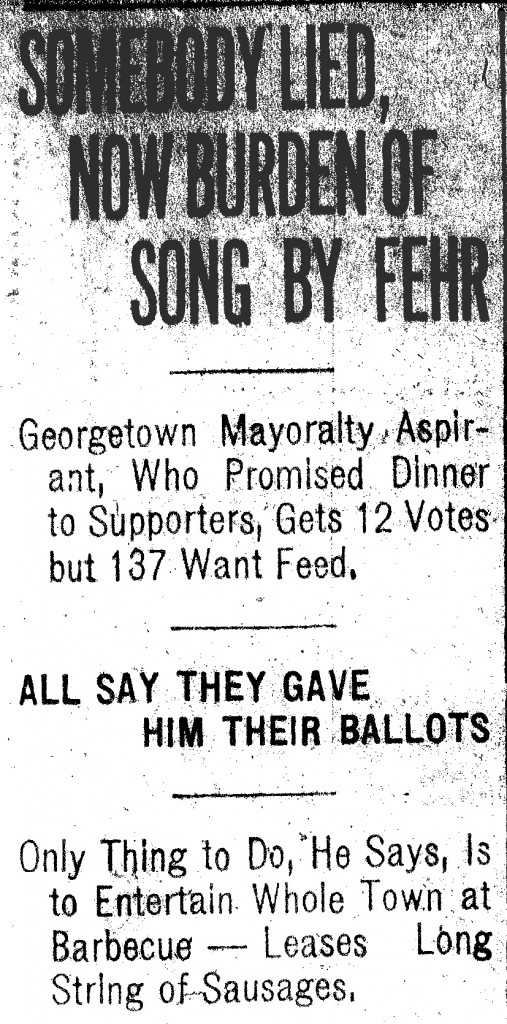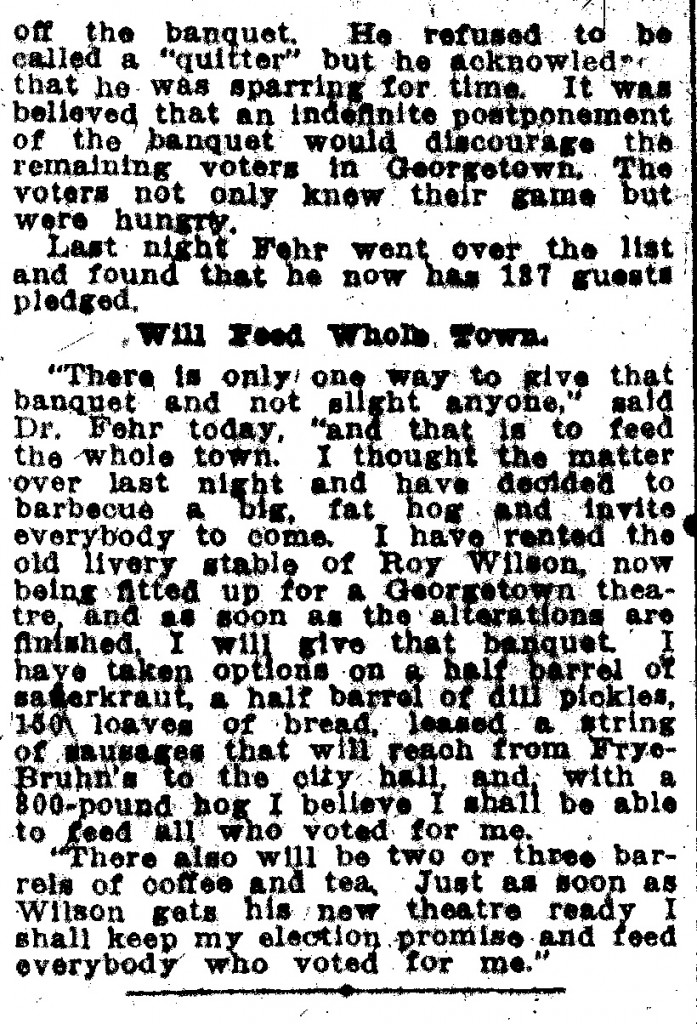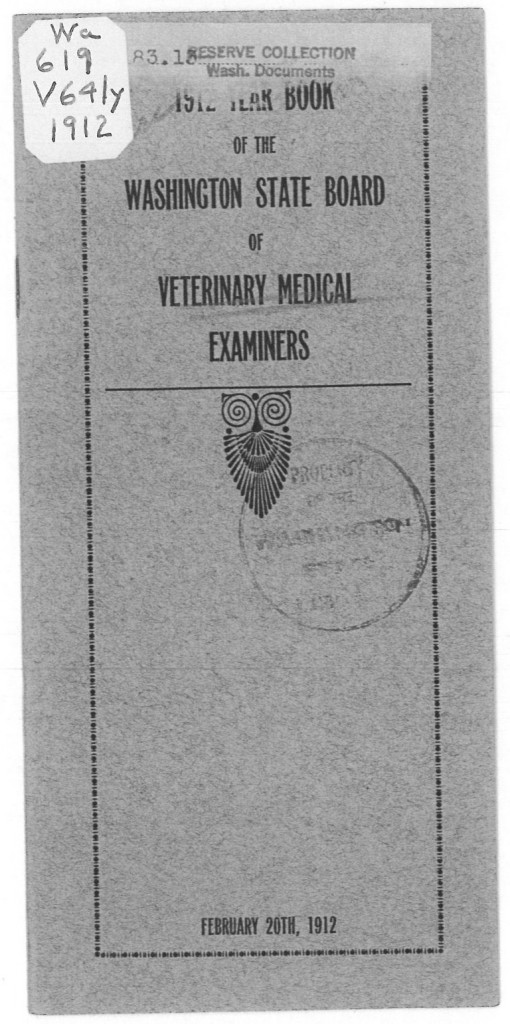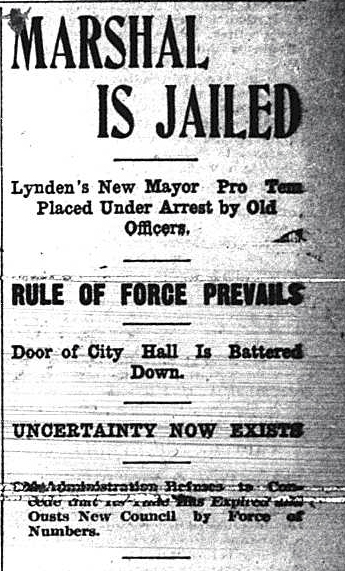 From the desk of Steve Willis, Central Library Services Program Manager of the Washington State Library:
From the desk of Steve Willis, Central Library Services Program Manager of the Washington State Library:
You would think that the inauguration of a local area figure to the office of Washington State Governor would be the commanding top of the fold headline. But not in the January 11, 1905 issue of The Bellingham Herald. Albert Mead’s swearing in ceremony does garner a nice spot, but above the gubernatorial news in bold caps across the top of the paper is the seven word declaration, followed by many smaller exciting sub-titles:
LYNDEN IS IN A STATE OF TURMOIL
MARSHAL IS JAILED
Lynden’s New Mayor Pro Tem Placed Under Arrest by Old Officers.
RULE OF FORCE PREVAILS
Door of City Hall Is Battered Down.
UNCERTAINTY NOW EXISTS
Old Administration Refuses to Concede that its Time Has Expired and Ousts New Council by Force of Numbers.
“The political turmoil in Lynden during the last few weeks came near resulting in a riot last night. The old administration, backed up by a mob of over one hundred citizens, battered in the doors of the city hall, placed the new town marshal and the new mayor pro tem under arrest and took possession of the city’s property. The new council, which had been organized and elected its officers and assumed that it was in control, was put to rout and is now seeking advise as to what should be done in the premises.”

“The three anti-saloon councilmen recently elected assumed that the old administration ceased to exist at midnight Monday. Accordingly they met at 12:30 o’clock yesterday, and proceeded to elect Councilman M. Dame [i.e. N. Bame] as mayor pro tem, the election having resulted in a tie vote for mayor. T.H. Day [i.e. F.B. Day] was elected town marshal.”
“Since the old council had called a meeting to be held at the city hall at 8 o’clock in the evening, trouble was anticipated. The new council adjourned its midday session with the understanding that another meeting was to be held at the hall at 8 o’clock in the evening. Marshal Day was left in charge with instructions to hold the fort at all hazards. At 7:15 o’clock the rival forces arrived on the scene and proceeded to take possession by force. Day was placed in jail for two hours and the mayor pro tem, who was in the hall at the time and who found himself helpless, was informed that he was under arrest. The old council proceeded to hold a session and then took the city books away from the hall, having placed them in charge of a man who is said to live outside of city limits.”
Looked Like Fierce Battle.
“For a time it seemed that a battle royal would ensue, and all because of the fact that as yet no one knows who constitutes the city government. Lynden has been in a state of ferment ever since the city election held December 6, 1904. It was a memorable election and will go down in the history of that former quiet little city as one of the fiercest contests ever waged at a municipal election. The clash which occurred last night causes the election episode to pale into insignificance.”
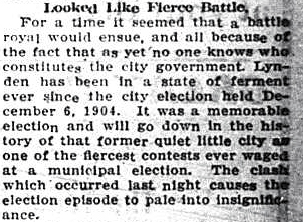
“At the time of the general election held in December it was found that there was a tie vote for the office of mayor and that is the beginning of the present chaotic condition of affairs. At a subsequent meeting of the council it was held that there was no election for the office of mayor. It appears from the testimony of Charles E. Cline, a resident of Lynden, that the old officials found a statute which they interpreted as giving them the authority to appoint a mayor for the entire year and who would serve up to the time of the next election. The other persons in the general vernacular known as the ‘antis’ denied that the law which they cited would give them such authority. Mr. Cline says the town charter provides that the new council shall hold office from and after the second Tuesday in January of each year, but the charter does not designate any hour of that date when they shall begin to hold office. The ordinance of Lynden fixing the time for holding the meetings of the council is silent in regard to the time for any meeting on that day.”
New Council Meets
“On Tuesday, January 10, the second Tuesday of the new year, there being no established law for the time of meeting a majority of the incoming council called a meeting by giving, as Mr. Cline says, legal notice to each member of the new council-elect that a meeting would be held at 12:30 o’clock yesterday afternoon. Mr. Cline says that the clerk, whose term of office expired with the old council, upon request gave to Mr. Dame [i.e. Bame], a member of the new council, the key to the city hall and access to all of the records and ordinances. A meeting of the incoming council was held, and a recess was taken until 8 o’clock p.m. At the meeting N. Dame [i.e. Bame] was elected mayor pro tem, W.H. Towner, clerk; F.B. Day, town marshal. Meantime the hall was left in charge of the new marshal, F.B. Day, with instructions to hold possession and allow no one to secure possession without due authority. At about 7:30 o’clock Hugh Breckenridge, who alleges that he is the legal mayor of the city by reason that he was elected by the old council, rapped at the door and was admitted by Mr. Day.”
“Later there was a rap at the door of the city hall and Mr. Day says he asked who was there and what was wanted.”
“The reply was, ‘I am the city marshal; let me in.'”
“Mr. Day says he replied as follows:”
“‘I am the new city marshal and cannot let you in this room, which is the instruction of the city council.'”
“To this Mr. Day says that the person outside replied: ‘Open this door or I will batter it down.’ The door was not opened as commanded and backed by a surging mob outside the door was broken down. Mr. Day says that the old town marshal, George Erz, at once said to him, ‘You can consider yourself under arrest,’ and, continued Mr. Day, ‘he forced me to go into the city jail at the rear of the city hall where I was held for about two hours. Mr. Dame [i.e. Bame], mayor pro tem, who was in the room at the time of the mob, was also told by Mr. Erz that he, too, was under arrest.'”
“After the crowd rushed into the council room Mr. Cline states that the alleged mayor, Hugh Breckenridge and the old council, proceeded to the transaction of business for the city. Several warrants were ordered paid and other business transacted.”
In Peculiar Position.
“The condition in which Lynden is now placed is a peculiar one and one in which the aid of the court will be invoked in order to determine which set of officers are in control. There are now two sets of officers each of which claims to be clothed with legal power to transact the business of the city.”
“Attorneys are now in consultation over the affair and quo warranto proceedings will probably be instituted against each of the alleged officers who composed the meeting that gained entrance to the city hall last night by the breaking of the doors of the hall.”
“A delegation of Lynden citizens is in the city today consulting attorneys relative to the affair. The representatives are: Charles E. Cline, Marshal F.B. Day, Councilmen Carr Bailey and D.J. Steffe.”

This article is a window into a political battle between the pro-liquor and anti-saloon factions in Lynden during the first decade of the 20th century. A very Calvinistic community (Lynden was once known for having the most churches per square mile in Washington State), the town didn’t have a saloon at all until 1903. Since the mob that broke into City Hall represented the pro-liquor faction, one has to wonder if alcohol was a factor in more than just political philosophy.
For awhile Lynden actually had two different city councils meeting during the same period of time, until the court sided with the anti-saloon crowd. Ultimately by 1910 the “antis” emerged victorious and liquor would not be served again in Lynden until the 1930s.
A very entertaining and detailed account of this episode can be found in Ed Nelson’s A History of Lynden (1995).
The same two gentlemen who tied for mayor also tied in the next election. This also happened in the town of McCleary in the late 1960s-early 1970s where the same candidates tied twice. In the McCleary case, the issue was settled both times by drawing a name out of the Sheriff’s hat– a much more peaceful solution.
[Thanks to Kim Smeenk for providing a nice copy of the Jan. 11, 1905 front page]
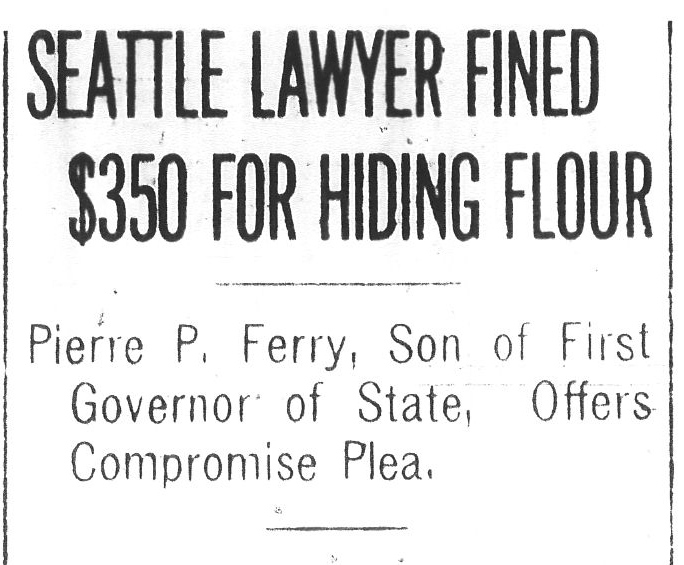 From the desk of Steve Willis, Central Library Services Program Manager of the Washington State Library
From the desk of Steve Willis, Central Library Services Program Manager of the Washington State Library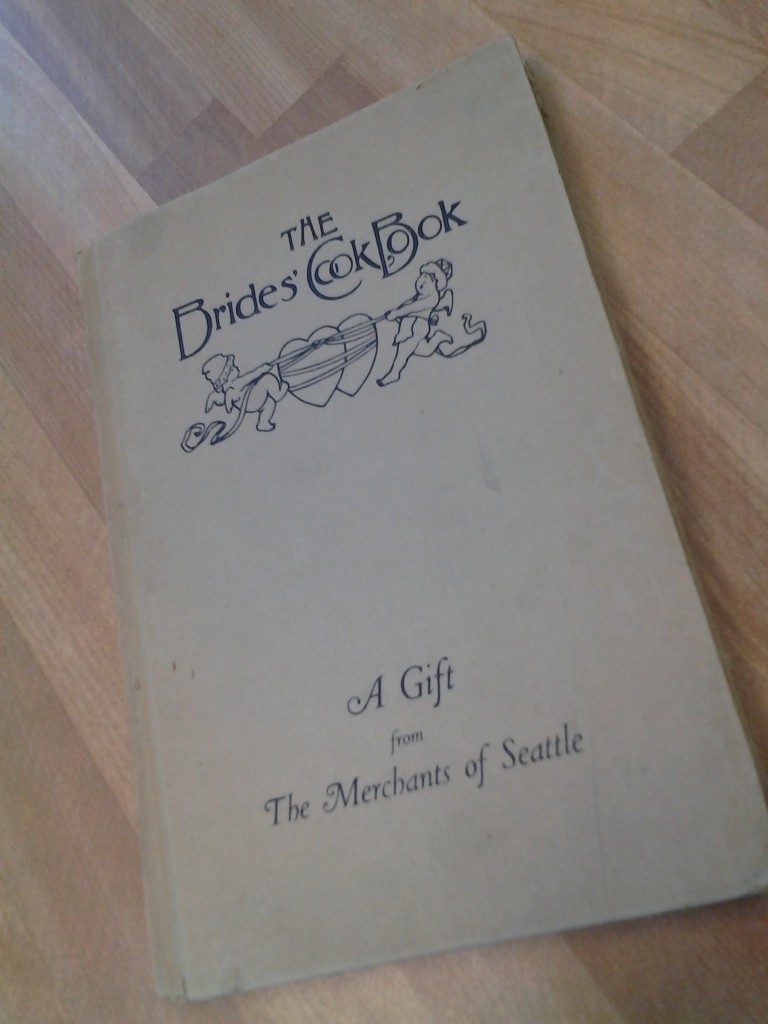 Flour hoarding was considered a crime in the United States during most of 1918 as the country mobilized for the Great War. The U.S. Food Administration apparently was seen as the enforcement agency. One curious publication in the WSL collection from this era is The Bride’s Cook Book, which takes wartime food rationing into account. A USFA official writes in the preface, “By following the Wheatless and Sugarless recipes contained therein the Housewife is performing a patriotic duty in the conserving of Food so necessary for our Allies and armies abroad.”
Flour hoarding was considered a crime in the United States during most of 1918 as the country mobilized for the Great War. The U.S. Food Administration apparently was seen as the enforcement agency. One curious publication in the WSL collection from this era is The Bride’s Cook Book, which takes wartime food rationing into account. A USFA official writes in the preface, “By following the Wheatless and Sugarless recipes contained therein the Housewife is performing a patriotic duty in the conserving of Food so necessary for our Allies and armies abroad.”










